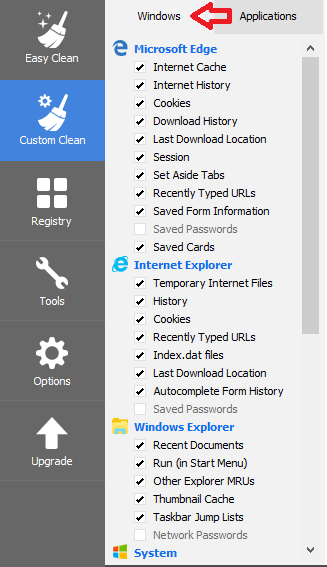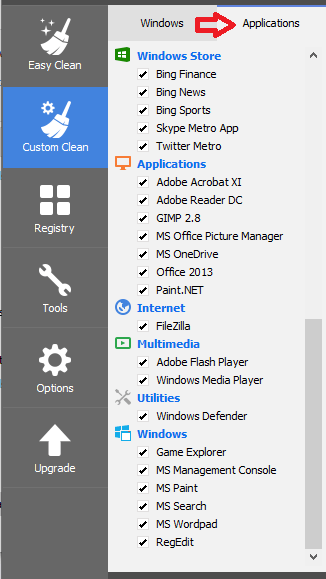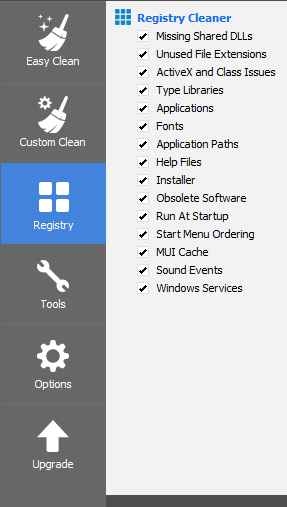CCleaner Custom Clean Settings post shows you how to activate the different options under custom cleaner settings and more.
Last Updated: November 26, 2019
Latest News: Updated the information.
Ccleaner custom clean settings allows you to clean many different areas in your computer/ laptop. As a rule of thumb, you should be running this tool once a week. This will prevent your system from becoming corrupted and sluggish. You will be surprised at how much garbage is accumulated in your computer when navigating on the internet every day.
The following documentation shows you how to enable or disable each option in the settings. It is up to you to choose what you want to clean. In most cases for most users I recommend cleaning everything. This method is safe and will make sure your computer/laptop is always clean.
However cleaning everything might not be ideal for you. The following is a list of options I disable in my laptop because I like to keep that information available so when something goes wrong I can check the log files. For example: Windows error log files.
Note: You might also want to disabled the password cleaning for each browser. This is good if you log into many sites like Facebook, Twitter etc and you don’t want to type the password every time you want to log in.
Recommended List To Disable:
System
- Windows Log Files
- Windows Error Reporting
Advanced
- Windows Event Logs
- Wipe Free Space
Download Ccleaner Files
- To download the installed version click on the following link ccleaner.
- To download the portable version click on the following link portable.
CCleaner Tutorials:
- Custom Clean Settings
- Tools Settings
- Options Setting
CCleaner Custom Clean Settings
Custom Clean Windows
Note: Before you begin reading, there are some tools in the list below that will not show up in your computer or laptop. Ccleaner is intelligent and will detect many different software, utilities, programs etc installed in your computer. So your list might be different to the list below.
Step 1 ) Start CCleaner and click on Custom Clean -> Windows tab to select from the following options as illustrated in the image below.
Microsoft Edge
- Internet Cache
- Internet History
- Cookies
- Download History
- Session
- Recently Typed URLs
- Saved Form Information
- Saved Passwords
Internet Explorer
- Temporary Internet Files
- History
- Cookies
- Recently Typed URLs
- Index.dat files
- Last Downloaded Location
- Autocomplete Form History
- Saved Passwords
Windows Explorer
- Recent Documents
- Run (in Start Menu)
- Other Explorer MRUs
- Thumbnail Cache
- Taskbar Jump Lists
- Network Passwords
System
- Empty Recycle Bin
- Temporary Files
- Clipboards
- Memory Dump
- Chkdsk File Fragments
- Windows Log Files
- Windows Error Reporting
- DNS Cache
- Font Cache
- Start Menu Shortcuts
- Desktop Shortcuts
Advanced
- Windows Event Logs
- Old Prefetch Data
- Menu Order Cache
- Tray Notification Cache
- Windows Size/Location Cache
- Environment Path
- User Assist History
- Old Windows Installation
- Custom Files and Folders
- Wipe Free Space
Once you are ready click on Analyze or Run Cleaner button.
You can click on Online Help any time you need to find answers to your questions. You can click on Check for updates to see if you are running the latest version.

Custom Clean Applications
Step 2 ) Click on Custom Clean -> Applications tab to select from the following options as illustrated in the image below.
Firefox
- Internet Cache
- Internet History
- Cookies
- Download History
- Session
- Site Preferences
- Saved Form Information
- Saved Password
- Compact Databases
Google Chrome
- Internet Cache
- Internet History
- Cookies
- Download History
- Last Download Location
- Session
- Saved Form Information
- Saved Password
- Compact Databases
Windows Store
- Bing Finance
- Bing News
- Bing Sports
- Bing Travel
- Skype Metro App
- Twitter Metro
Applications
- Adobe Acrobat XI
- Adobe Reader DC
- GIMP 2.8
- McAfee Antivirus
- MS Office Picture Manager
- MS OneDrive
- Nero 12 Platinum HD Suite
- Office 2013
- Paint.NET
Internet
- FileZilla
- LogMeIn
- Skype
- Windows Live Messenger
Multimedia
- Adobe Flash Player
- CyberLink PhotoDirector 3
- Macromedia Shockwave 11
- Microsoft Silverlight
- Quicktime Player
- Windows Media Player
Utilities
- Malwarebytes Anti-Malware
- Windows Defender
Windows
- Game Explorer
- MS Management Console
- MS Paint
- MS Search
- RegEdit
Once you are ready click on Analyze or Run Cleaner button.

Step 3 ) Click on Registry tab to select from the following options as illustrated in the image below.
Note: As a rule of thumb, I select all options to clean. However in your case you might want to exclude some for various reasons.
Registry Cleaner
- Missing Shared DLLs
- Unused File Extensions
- ActiveX and Class Issues
- Type Libraries
- Applications
- Fonts
- Applications Paths
- Help Files
- Installer
- Obsolete Software
- Run At Startup
- Start Menu Ordering
- MUI Cache
- Sound Events
- Windows Services
Once you are ready click on Scan for Issues button. If it finds any issues, it will activate the Fix selected issues… button.

Click on the following link CCleaner Tools Settings to complete the second part.
I will be updating this post from time to time, so keep coming back for the latest changes.
If you have any questions please let me know.
Enjoy.
CCleaner Tutorial List: